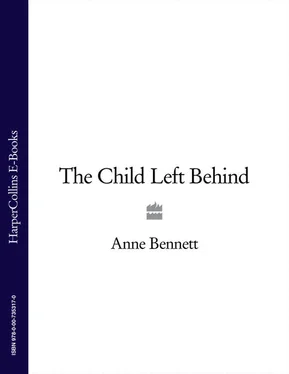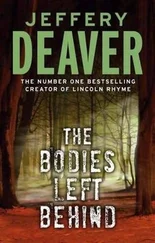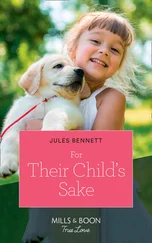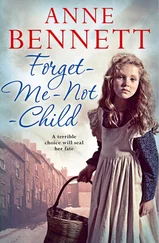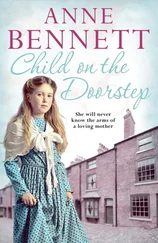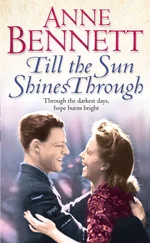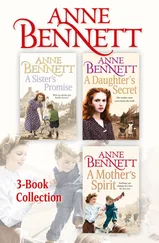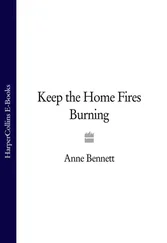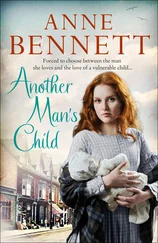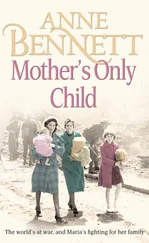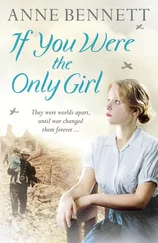The Child Left Behind
Anne Bennett
This book is dedicated to my sister in lawKathy Flanagan, with love and in memoryof my brother Shaun, who tragically diedon 5th March 2009 RIP.
Cover Page
Title Page The Child Left Behind Anne Bennett
Dedication This book is dedicated to my sister in lawKathy Flanagan, with love and in memoryof my brother Shaun, who tragically diedon 5th March 2009 RIP.
ONE
TWO
THREE
FOUR
FIVE
SIX
SEVEN
EIGHT
NINE
TEN
ELEVEN
TWELVE
THIRTEEN
FOURTEEN
FIFTEEN
SIXTEEN
SEVENTEEN
EIGHTEEN
NINETEEN
TWENTY
TWENTY-ONE
TWENTY-TWO
TWENTY-THREE
TWENTY-FOUR
TWENTY-FIVE
TWENTY-SIX
TWENTY-SEVEN
TWENTY-EIGHT
TWENTY-NINE
THIRTY
Author’s notes
ACKNOWLEDGEMENTS
By the same author
Copyright
About the Publisher
Finn Sullivan couldn’t understand his family. They had been aware of the rumblings of an unsettled Europe and so why were they surprised when Britain declared war on Germany on 4 August 1914? When the news filtered through to them, via the postman, in their cottage in Donegal, Finn’s eldest brother, Tom, went to Buncrana, their nearest town, and bought a paper so that they could read all about it.
‘England has declared war on Germany because they invaded two other countries,’ he said as the family sat eating their midday meal.
‘Well, if that’s about the strength of it,’ his father, Thomas John, remarked, ‘it’s a wonder that no one can see the irony.’
‘What do you mean?’ Finn’s brother Joe asked.
‘Well, isn’t that what England has done to us?’ Thomas John said. ‘They invaded us, didn’t they? Who rules Ireland now?’
‘Not the Irish, that’s for sure,’ Biddy, Finn’s mother replied. ‘It’s England has us by the throat.’
‘Aye,’ Thomas John said, ‘and that means anything that involves England automatically involves us too.’
‘You mean the war?’ Finn asked.
‘Of course I mean the war, boy. What else?’
Finn coloured in anger. He hated being called ‘boy’ by his father now he was over eighteen.
‘So you think there will be call-up here?’ Joe asked.
‘Don’t see how we will get away without it,’ Thomas John said.
‘Maybe they are hoping for volunteers,’ Tom said. ‘After all, young Englishmen are volunteering in droves. The recruiting offices are hard-pressed to cope with the numbers who want to take a pop at the Germans. So the paper says, anyway.’
‘And why would Irish boys volunteer to fight for a country that has kept them down for years and years?’ Thomas John demanded.
‘The carrot that they are holding out might have something to do with that,’ Tom said.
‘What’s that?’ Joe asked. ‘Have to be some big bloody carrot, for I would not volunteer to lift one finger to help England.’
‘The paper claims that the government will grant Ireland independence if they get Irish support in this war.’
‘Let me see that,’ Thomas John said, and Tom passed the paper to his father, who scanned in quickly. ‘That’s what it says all right, and I don’t believe a word of it. To my knowledge, England has never kept any promise it has made to Ireland and the Irish. For my money they can sink or swim on their own. We will keep our heads down and get on with our lives. It’s no good seeking trouble. In my experience it will come knocking on the door soon enough.’
Finn couldn’t believe that his father thought their dull, boring lives would go on totally unaffected by the war being fought just across a small stretch of water.
To Finn, war was new and exciting. He knew that in the army no one would look down on him because of his youth and no one there would call him ‘boy’.
He didn’t share these thoughts, but when his young sister Nuala came in from her nursemaid’s job at the Big House and was told the news later, she noted the look on Finn’s face and the zealous glint in his deep amber eyes, and she shivered and hoped that her impetuous brother wouldn’t do anything stupid.
War dominated the papers and Finn read everything he could about it. After the first weeks there were pictures of the first troops to go overseas waving out of train carriages, all happy and smiling. They would soon kick the Hun into touch, the papers said, and be home by Christmas with the job done. Finn looked at the pictures and ached to be there amongst them.
The following Saturday morning, he tripped getting up from the milking stool and spilled half a pail of milk over the straw on the floor of the byre. Thomas John, suddenly angered by the mess, gave him such a powerful cuff across the side of his head that it knocked him to the floor, although he had never raised his hand to any of his children before.
No one helped Finn to his feet and he was glad, because he would have hated his brothers to see the tears he brushed away surreptitiously.
‘Don’t worry about it, Finn,’ Tom said quietly as they walked back to the house. ‘You know Daddy’s temper flashes up out of nothing and is gone in an instant. He will be over it in no time.’
But I won’t be, Finn thought, but he said nothing.
When he set out for Buncrana later that morning with Tom and his mother, he was as angry as ever. This anger was increased as Biddy took out her purse as they pulled into the town and, dropping some coins into Finn’s hand, told him to go to the harbour and buy some fish for their dinner.
Finn never got to the harbour, however, because as he turned down Main Street he heard a military band and saw the line of soldiers at the bottom of the hill. In front of this company was a tall officer of some sort, in full regalia, and so smart, even the buttons on his uniform sparkled in the early autumn sunshine. He held a stick in his left hand.
Suddenly the band behind him began to play and the officer led the soldiers up the hill to the marching music, the beat emphasised by the young drummer boy at the front. The officer’s boots rung out on the cobbled street, the tattoo of the soldiers’ tramping feet completely in time.
Shoppers and shopkeepers alike had come to the doorways to watch the soldiers’ progress. As they drew nearer, though, Finn was unable to see the officer’s eyes, hidden as they were under the shiny peak of his cap, but his brown, curly moustache fairly bristled above the firm mouth in the slightly red and resolute face.
Finn felt excitement swell within him so that it filled his whole being. Tom, brought out of the Market Hall to see what was happening, saw the fervour filling his brother’s face and he was deeply afraid for him, but the press of people made it impossible for him to reach Finn.
And then the company stopped, and while the soldiers stood to attention the officer talked words that were like balm to Finn’s bruised and battered soul, words like ‘pride’, ‘integrity’ and ‘honour’ to serve in the British Army, whose aim was to rid the world of a nation of brutal aggressors. The army would crush the enemy who marched uninvited into other counties, harassing and persecuting innocent men, women and children, and they would deal swiftly and without mercy to any who opposed them.
Many, he said, had already answered the call and now he wished to see if young Irishmen had what it took to join this righteous fight. He wanted to see if they felt strongly enough for the poor people of Belgium and France, their fellow human beings, who were prepared to fight to the death for freedom. Any who felt this way should step forward bravely.
Читать дальше
